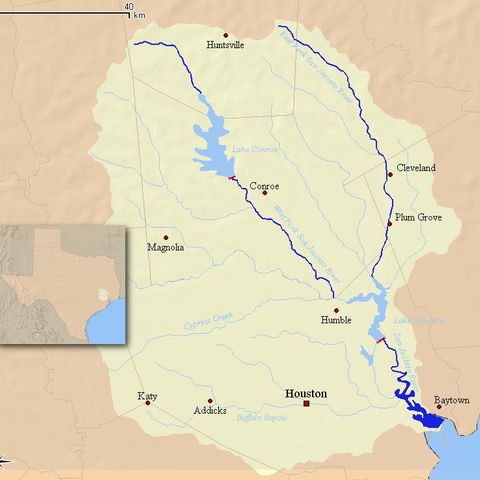20 Managing Houston Flooding: Floodplain Expert Bob Freitag and Environmental Advocate Susan Chadwick

Sign up for free
Listen to this episode and many more. Enjoy the best podcasts on Spreaker!
Download and listen anywhere
Download your favorite episodes and enjoy them, wherever you are! Sign up or log in now to access offline listening.
Description
Today we are joined by Susan Chadwick, environmental advocate and Executive Director of Save Buffalo Bayou, and Bob Freitag, expert on hazard mitigation and floodplain management, to discuss -Houston flooding...
show more-Houston flooding
-the USACE Interim Report (2020) on trying to manage flooding by altering Buffalo Bayou and Cypress Creek
-floodplain management
-modern science vs. old thinking about streams and floodplains
-the nature of streams
-how streams interact with geology, tides, flora, ecology, and climate
-strategies for managing flooding
-cost-benefit analyses of different strategies
-benefits of modern, scientific, natural strategies over those of old, constrained strategies
-what has worked elsewhere in the country and the world, and how some places are "rewilding" streams and discovering the deep, varied economic value of free "ecological services"
About Susan: Susan Chadwick, a writer and journalist who grew up on Buffalo Bayou, is the president and executive director of Save Buffalo Bayou. She was the art critic for the Houston Post from 1985 until it closed in 1995.
More about Susan, her work, and her contact info, at:
a. https://www.linkedin.com/in/susan-chadwick-66502a3b/
b. www.SaveBuffaloBayou.org
c. https://www.facebook.com/SaveBuffaloBayou/
About: Bob Freitag is Senior Instructor Part-time and Director of the Institute for Hazards Mitigation Planning and Research (IHMP). The University of Washington Institute for Hazards Mitigation is an interdisciplinary academic Institute housed in the Department of Urban Design and Planning within the College of Built Environments at the University of Washington. http://mitigate.be.uw.edu) He is the past Executive Director of the Cascadia Region Earthquake Workgroup (http://www.crew.org/) and past member of the Association of State Floodplain Managers’ Board of Directors. (http://www.floods.org/) Bob is also a Certified Floodplain Manager. He has published many articles and written courses for FEMA and others concerning hazards mitigation and floodplain management, and was lead author of “Floodplain Management: a new approach for a new era” (Island Press 2009).
Before coming to the University, he had a 25-year career with the Federal Emergency Management Agency (FEMA) serving as Federal Coordinating Officer (FCO); Public Assistance, Mitigation and Education Officer. Prior to FEMA he was employed by several private architectural and engineering consultant firms in Hawaii and Australia, and taught science as a Peace Corps Volunteer in the Philippines. Freitag received his Master of Urban Planning degree from the University of Washington.
Contact Bob here: http://urbdp.be.washington.edu/people/robert-freitag/
His book Floodplain Management: A New Approach for a New Era
by Bob Freitag, Susan Bolton, Frank Westerlund, Julie Clark: https://www.amazon.com/Floodplain-Management-New-Approach-Era/dp/1597266353
Contact Michael:
1. ccerppodcast@aol.com
2. http://www.goldams.com
3. https://www.linkedin.com/in/michael-gold-2883921/
4. https://www.facebook.com/groups/1152144714995033/
Join us at CCERP on Facebook! https://www.facebook.com/groups/1152144714995033/
Show notes:
1. Effect of and damage caused by Hurricane Harvey: https://www.khou.com/article/weather/hurricane/harvey/final-report-shows-harveys-impact-on-harris-county-by-the-numbers/285-562016932
2. 2019 disasters and their costs: https://www.miamiherald.com/news/nation-world/national/article239153533.html
3. US Army Corps of Engineers' "Buffalo Bayou and Tributaries Resiliency Study, Texas:" https://www.swg.usace.army.mil/Portals/26/BBTnT_Interim_Report_202001001_Final_1.pdf?fbclid=IwAR0VI6q_U1Td_J3YXUwE3yMgwOKF3qsa0-BbZa8nRhIjZKKDiWg95823bcA
4. Vermont flooding in Irma: "The Connecticut River Watershed Council and The Conservation Law Foundation have joined together to step back to look at why Otter Creek in Rutland leapt up as Irene struck, increasing in flow by nearly 20 times in the space of a little more than a day, while downstream in Middlebury the river rose much more gradually, and more safely." https://www.youtube.com/watch?v=ucb-Y8iipng&fbclid=IwAR1g9l0tePGJxV3fj1xfrpWvtxKKTTaV84TXzQp3bh4CQT1ipOjkLebXHJg
5. Rewilding Europe
a. https://rewildingeurope.com
b. https://www.nature.org/en-us/about-us/where-we-work/europe/stories-in-europe/restoring-free-flowing-rivers-in-europe/
c. https://europe.wetlands.org/publications/ecosystem-services-and-river-restoration/
d. https://ec.europa.eu/environment/life/project/Projects/index.cfm?fuseaction=home.showFile&rep=file&fil=LIFE09_INF_UK_000032_LAYMAN.pdf
6. The importance of Beavers
a. https://www.youtube.com/watch?v=E4t8h8nchfM
b. https://www.npr.org/2018/06/24/620402681/the-bountiful-benefits-of-bringing-back-the-beavers
c. https://www.youtube.com/watch?v=rwnXLllzi60
d. https://www.aswm.org/aswm/aswm-webinarscalls/3355-2020-past-beaver-restoration-webinar-series#beaver1
7. Of the Mississippi River, "Mark Twain noted in 1883 that 'ten thousand river commissions, with the mines of the world at their back, cannot tame that lawless stream, cannot curb it or confine it, cannot say to it, go here, or go there, and make it obey.' From: https://www.independent.co.uk/news/long_reads/mississippi-national-waterway-trump-infrastructure-river-enviorment-a8266366.html
8. Rising Tide: The Great Mississippi Flood of 1927 and How it Changed America by John M. Barry: https://www.amazon.com/Rising-Tide-Mississippi-Changed-America/dp/0684840022/
9. A tree, depending on factors such as age and species, can absorb 20-250 gallons of water per day, more or less. At , say 400 trees per acre in a forest, that is 8,000-100,000 galleons of water per day.
See, for example:
a. https://www.lsu.edu/botanic-gardens/research/trees.php
b. https://aces.nmsu.edu/pubs/_h/H636/
c. https://naldc.nal.usda.gov/download/34466/PDF
d. https://www.fs.fed.us/projects/hfi/
10. Klamath River Restoration
a. http://www.klamathrenewal.org
b. https://www.nfwf.org/programs/klamath-basin-restoration-program
c. Salmon River: http://srrc.org
11. Land subsidence from water discharge
a. "Land Subsidence From Ground-Water Pumping" by S. A. Leake, U.S. Geological Survey: https://geochange.er.usgs.gov/sw/changes/anthropogenic/subside/
b. "Texas Gulf Coast Groundwater and Land Subsidence:" https://txpub.usgs.gov/houston_subsidence/home/index.html
c. "Land Subsidence due to Ground-Water Withdrawal Tulare-Wasco Area California" by B. E. Lofgren and R. L. Klausing: https://pubs.usgs.gov/pp/0437b/report.pdf
d. "SAN JOAQUIN VALLEY, CALIFORNIA:" https://pubs.usgs.gov/circ/circ1182/pdf/06SanJoaquinValley.pdf
12. David Suzuki Foundation: https://davidsuzuki.org
13. Ecosystem Valuation
a. "The Value of the World's Ecosystem Services and Natural Capital"by Robert Costanza, et. al.: https://mro.massey.ac.nz/bitstream/handle/10179/9476/Costanza%20et%20al%20%20Nature%201997%20prepublicaton.pdf
b. "Twenty years of ecosystem services: How far have we come and how far do we still need to go?" by Robert Costanza, et. al.: https://www.robertcostanza.com/wp-content/uploads/2017/02/2017_J_Costanza-et-al.-20yrs.-EcoServices.pdf
c. TED talk: https://www.youtube.com/watch?v=RaAEfERGyO8
d. Robert Costanza talk "Flourishing on Earth: Lessons from Ecological Economics:" https://www.youtube.com/watch?v=PZkTlVPgqG4
e. "Natural Capital and Ecosystem Services – Professor Robert Costanza:" https://www.youtube.com/watch?v=m4F3M1b1bdI
14. Association of State Wetland Managers
a. https://duckduckgo.com/?q=Assiation+wetland+managers&t=osx&ia=web
b. their floodplain functions videos: https://www.aswm.org/watersheds/natural-floodplain-function-alliance/1790-webinars.html
c. ecosystem valuation: https://www.aswm.org/wetland-science/planning-design/ecosystem-service-valuation
d. links to science on floodplains, wetlands, restoration, etc.: https://www.aswm.org/wetland-science
15. Tides and rivers
a. https://eos.org/research-spotlights/when-rivers-and-tides-collide
b. https://agupubs.onlinelibrary.wiley.com/doi/full/10.1002/2015RG000507
16. Food Forests
a. https://www.youtube.com/watch?v=6GJFL0MD9fc
b. https://www.youtube.com/watch?v=Q_m_0UPOzuI
c. https://www.youtube.com/watch?v=mjUsobGWhs8
d. https://projectfoodforest.org/what-is-a-food-forest/
e. https://www.wildhomesteading.com/food-forest/
17. Range: Why Generalists Triumph in a Specialized World by David Epstein: https://www.amazon.com/Range-Generalists-Triumph-Specialized-World/dp/0735214484/
18. Learning environments and domains: "kind" vs. "wicked"
a. https://www.psychologytoday.com/us/blog/the-media-psychology-effect/202010/the-success-equation-our-wicked-world
b. https://www.psychologytoday.com/us/blog/experience-studio/202007/experience-kind-vs-wicked
Bios courtesy Susan Chadwick and Bob Fretag
Image from: https://commons.wikimedia.org/wiki/File:SanJacinto_Watershed.png
Information
| Author | Michael Gold |
| Organization | Michael Gold |
| Website | - |
| Tags |
Copyright 2024 - Spreaker Inc. an iHeartMedia Company
